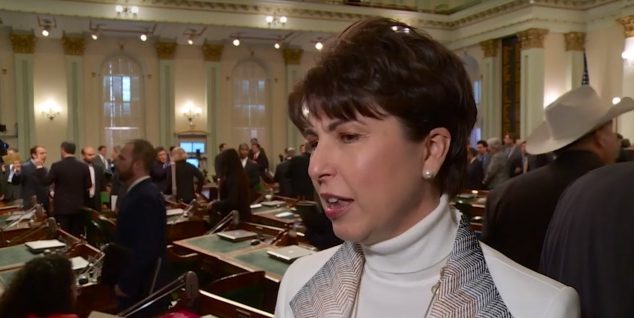News
Disclosing sexual misconduct — or not
 State Sen. Connie Leyva, D-Chino, on the Senate floor. (Photo: Screen capture, YouTube)
State Sen. Connie Leyva, D-Chino, on the Senate floor. (Photo: Screen capture, YouTube)Chantal Cousineau said the disclosures started like a whisper.
Over the years, she had discussed her experience working with James Toback on the film “Harvard Man” in 2000. But this fall, after allegations about producer Harvey Weinstein emerged, Cousineau sent a tweet: “Can we talk about #JamesToback next?”
Her wish was granted. Over the next several days, women came to her with stories of harassment, abuse, and threats. involving Toback, a prominent Hollywood director.
Many believe “NDAs” enabled repeat offenders like Weinstein and Toback to fly under the radar for so many years.
The group, a sisterhood forged in trauma, grew to eight, and then 38 women within a matter of days. Those 38 shared their stories about Toback with the L.A. Times, and since that investigation was published, more than 300 other women have come forward with their own tales.
That astounding number begs the question—over all these years, why did it take so long for the truth to emerge?
Some blame nondisclosure agreements. While Cousineau didn’t sign one herself, many have said these documents enabled repeat offenders like Weinstein and Toback to fly under the radar for so many years.

Chantal Cousineau. (Photo: Kathy Hutchins)
That’s why state Sen. Connie Leyva, D-Chino, has authored a bill, SB 820, to ban these secrecy-driven agreements in cases of sexual assault, harassment, or discrimination. While last year’s tide of allegations, particularly in the Capitol itself, stirred broad support for policy change, there is considerable debate within those supporters about whether this bill is the best approach.
Notably, in early January, attorney Gloria Allred said she thought the legislation would be a “mistake,” adding that she feared it would limit victims’ options.
But Leyva contends that by including a provision for victims to exercise the nondisclosure option themselves, SB 820 doesn’t limit options. Instead, the bill alters the status quo, in which defendants are empowered to silence their victims through nondisclosure agreements, according to Jacquie Serna, legislative counsel for the Consumer Attorneys of California, which is co-sponsoring the bill.
“Right now that’s completely in the power of the defendant and the wrong-doer,” Serna said. “With our bill that will change. It will tip the scales of justice in the other way.”
But Leslie Levy, a women’s rights attorney in the Bay Area, says the bill doesn’t go far enough.
Though as written, the bill says only plaintiffs can initiate a nondisclosure, Levy believes that in practice, plaintiffs will be pressured to make that choice.
“What other crimes do we allow people to silence other people about?” — Leslie Levy
“All of the Weinstein settlements probably would have remained confidential,” she said. “[The bill is] a façade that might make somebody feel good, that they’re making it the plaintiff’s option, but really it leaves as much power in the hands of the harasser as there has ever been.”
Instead, Levy instead wants to see a complete ban on these agreements, as a matter of public safety.
Sen. Leyva said in an interview that the bill is intended to send a message to predators that they can’t buy silence from victims. But according to Levy, as long as nondisclosure agreements are legal at all, predators will still be able to hide their crimes, enabling them to continue victimizing other people.
“What other crimes do we allow people to silence other people about?” Levy said. “If I robbed you and you sued me, could I shut you up about me having robbed you? No. It’s a public policy issue.”
Barry Broad, an attorney who represents laborers including the show business union SAG-AFTRA, supports the bill. He argued that regardless of the defense’s ability to continue pushing for a nondisclosure agreement, often by offering a larger financial settlement, the power to initiate that agreement still would remain entirely in the plaintiff’s hands.
When women settle a case involving harassment, they may not want the details to become public for a variety of reasons. The experience can be traumatizing, and privacy to deal with that trauma can be important. Others fear damage to their reputations.
“I’ve resolved that in my mind that if I never worked again, then that would be worth the price of discussing this issue and affecting change.” — Chantal Cousineau
“You can win the battle and lose the war,” Broad said. He said that even when perpetrators are held accountable, many whistleblowers’ careers suffer because they become known as “troublemakers.”
Cousineau noted that among the women who came forward about Toback initially, she was the only one who actually worked with him. The rest had just auditioned for him. The effect coming forward might have on a professional in any career path is difficult to quantify, Cousineau said. But for her, the consequences were clear: She didn’t want to act any more.
“I’ve spoken publicly because I’ve resolved that in my mind that if I never worked again, then that would be worth the price of discussing this issue and affecting change.” Cousineau said. But she added, “I don’t think victims should all be forced to disclose that they’ve fought for themselves.”
Levy argues that victims don’t need a nondisclosure agreement to keep the facts of the case confidential. In a pre-litigation settlement, there is no public record. The negotiations remain between the plaintiff and defendant’s attorney.
“I don’t want a mediation. I don’t want money. I just don’t want this to happen.” — Chantal Cousineau
Rather than negotiating a legal document that is binding for the victim’s lifetime, Levy argued that women should simply not speak publicly if they want to remain confidential. This would allow them to retain the right to speak up later should they choose to, Levy said.
Cousineau has not taken a position on this bill specifically, but as a victim herself and an advocate who’s listened to the experiences of many women, she believes nondisclosures should only reflect the needs of the victim.
“I don’t want a mediation. I don’t want money. I just don’t want this to happen,” she said.
As the situation remains, this is still a major problem for women in film and other industries. Cousineau pointed out that the Weinstein company had a line written into its budget for settlements.
“When it becomes part of your company’s spending budget, that’s not a solution for this problem,” she said.
Leyva agreed that more work needs to be done. “[Women] will just get to come to work do their job and be respected,” she said. “That’s really what most women want–most people want–when they come to work.”
Want to see more stories like this? Sign up for The Roundup, the free daily newsletter about California politics from the editors of Capitol Weekly. Stay up to date on the news you need to know.
Sign up below, then look for a confirmation email in your inbox.

Leave a Reply